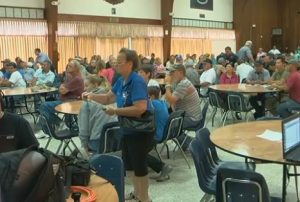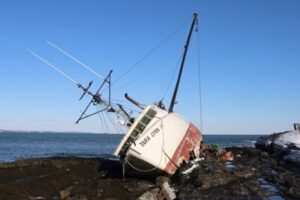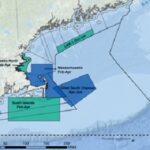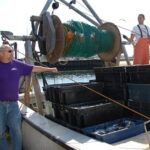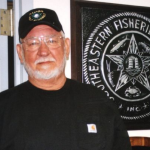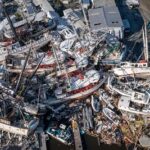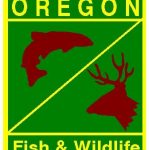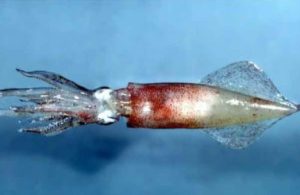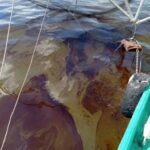Tag Archives: John Williams
Fishermen Taking Aim At Offshore Wind Projects Across Texas
 Fishermen are taking aim at offshore wind projects across Texas and the United States. On the same day that the Biden Administration pulled the plug on the second lease auction of a major proposed offshore wind project near the LA-TX border, the Bureau of Ocean Energy Management (BOEM) announced that it had been approached by “Hecate Energy Gulf Wind LLC (Hecate Energy) to acquire commercial wind energy lease(s) on the Outer Continental Shelf (OCS) in the Gulf of Mexico.” This potential project would transform thousands of aquatic acres into a wind farm. more, >>CLICK TO READ<< 17:04
Fishermen are taking aim at offshore wind projects across Texas and the United States. On the same day that the Biden Administration pulled the plug on the second lease auction of a major proposed offshore wind project near the LA-TX border, the Bureau of Ocean Energy Management (BOEM) announced that it had been approached by “Hecate Energy Gulf Wind LLC (Hecate Energy) to acquire commercial wind energy lease(s) on the Outer Continental Shelf (OCS) in the Gulf of Mexico.” This potential project would transform thousands of aquatic acres into a wind farm. more, >>CLICK TO READ<< 17:04
Southern Shrimp Alliance: The Outlaw Ocean Project Investigation Regarding Imported Shrimp Supply Chains
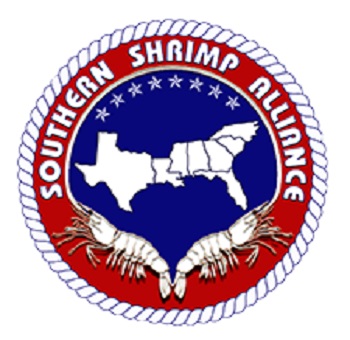 On the same day that Corporate Accountability Lab (CAL) publicly released the results of its three-year investigation into forced labor practices in the Indian shrimp industry, Hidden Harvest: Human Rights and Environmental Abuses in India’s Shrimp Industry, and the Associated Press published an article and video news story by investigative journalists Martha Mendoza, Mahesh Kumar, and Piyush Nagpal confirming CAL’s findings, The Outlaw Ocean Project has provided a rare view into the inner workings of a major Indian shrimp exporter to the United States, Choice Trading Corporation Private Limited. more, >>click to read<< 09:25
On the same day that Corporate Accountability Lab (CAL) publicly released the results of its three-year investigation into forced labor practices in the Indian shrimp industry, Hidden Harvest: Human Rights and Environmental Abuses in India’s Shrimp Industry, and the Associated Press published an article and video news story by investigative journalists Martha Mendoza, Mahesh Kumar, and Piyush Nagpal confirming CAL’s findings, The Outlaw Ocean Project has provided a rare view into the inner workings of a major Indian shrimp exporter to the United States, Choice Trading Corporation Private Limited. more, >>click to read<< 09:25
North Carolina: State’s shrimping industry needs Cooper’s support
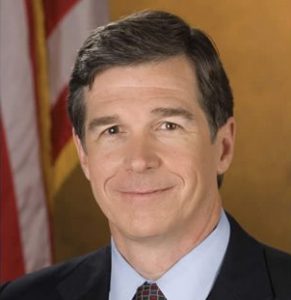 As the state’s shrimping industry faces a perfect storm of challenges that may result in the demise of hundreds of family owned fishing businesses, it is time for Governor Cooper to show that he is as committed to the small entrepreneur as he is the large industrial investors that he continually promotes whenever a ribbon cutting opportunity arises. John Williams, executive director of the Southern Shrimp Alliance has sent a letter to eight coastal governors, including North Carolina’s, asking their support both financially and politically as the domestic shrimping industry faces unprecedented challenges to its existence. So far the alliance has not received a positive response. Describing the situation as “an unprecedented catastrophic crisis that threatens its (the domestic shrimping industry’s) very existence,” William’s letter notes that foreign imports along with high fuel prices are devastating “the many family-owned businesses that are the core of the economies of coastal communities.” >>click to read<< 08:36
As the state’s shrimping industry faces a perfect storm of challenges that may result in the demise of hundreds of family owned fishing businesses, it is time for Governor Cooper to show that he is as committed to the small entrepreneur as he is the large industrial investors that he continually promotes whenever a ribbon cutting opportunity arises. John Williams, executive director of the Southern Shrimp Alliance has sent a letter to eight coastal governors, including North Carolina’s, asking their support both financially and politically as the domestic shrimping industry faces unprecedented challenges to its existence. So far the alliance has not received a positive response. Describing the situation as “an unprecedented catastrophic crisis that threatens its (the domestic shrimping industry’s) very existence,” William’s letter notes that foreign imports along with high fuel prices are devastating “the many family-owned businesses that are the core of the economies of coastal communities.” >>click to read<< 08:36
Imported shrimp eaten in U.S. may not be safe – U.S. Rep. Castor wants to do something about it
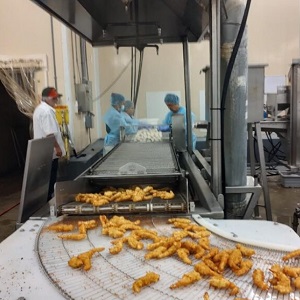 With inventories of shrimp sitting at docks throughout the Gulf Coast due to an abundance of imported seafood, the shrimp industry and U.S. Rep. Kathy Castor of Florida want to increase the purchase of domestic shrimp in the United States and provide more federal funding to regulate imported shrimp for consumers. John Williams is the executive director of the Southern Shrimp Alliance, which represents members of the shrimp industry from Texas through North Carolina. He said a lot of his members that are suffering right now. Castor’s bill, the Laws Ensuring Safe Shrimp Act (LESS Act) would address that issue by vastly increasing funding for the FDA to do inspections of foreign produced shrimp. >click to read< 16:07
With inventories of shrimp sitting at docks throughout the Gulf Coast due to an abundance of imported seafood, the shrimp industry and U.S. Rep. Kathy Castor of Florida want to increase the purchase of domestic shrimp in the United States and provide more federal funding to regulate imported shrimp for consumers. John Williams is the executive director of the Southern Shrimp Alliance, which represents members of the shrimp industry from Texas through North Carolina. He said a lot of his members that are suffering right now. Castor’s bill, the Laws Ensuring Safe Shrimp Act (LESS Act) would address that issue by vastly increasing funding for the FDA to do inspections of foreign produced shrimp. >click to read< 16:07
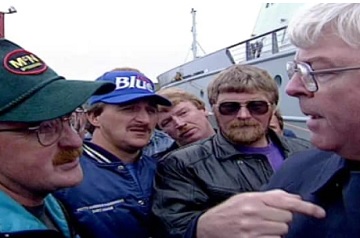
30 years after N.L. cod moratorium – the wins are few and losses are many
John Williams wishes he could say the cod moratorium of 1992 feels like it was yesterday. But after losing his livelihood and reinventing himself a few times over, he’s felt every one of the past 30 years. Williams was one of about 30,000 people put out of work when the federal government brought an end to the northern cod fishery on July 2, 1992. It’s a date that still stirs up feelings from a solemn and desperate chapter in Newfoundland and Labrador’s history. “It was a pretty sad time to know that you weren’t going to go fishing anymore,” Williams said. “At the time I had three kids, and they had to be fed, go to school, and be clothed. It was tough.” It doesn’t help Williams that he’s constantly reminded of his small role in history — being the person who prompted former Fisheries Minister John Crosbie to utter some of his most famous words. Video, photos, >click to read< 08:38
Today Marks 30th Anniversary of Cod Moratorium – Gus Etchegary spent his working life in the fishery and has been an outspoken advocate for the industry. He believes a big contributing factor keeping stocks low is seal predation, which wasn’t a problem when stocks were healthy. He says when the resource was huge there was little impact because replacement levels overcame any pressure put on the stocks by seal predation. >click to read< 09:40
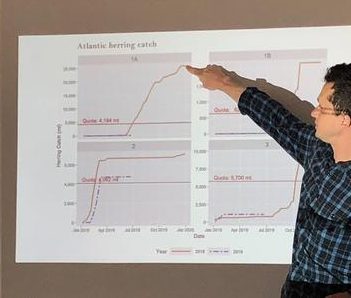
With herring shortage, lobster industry looks to other bait sources
The care and feeding of lobsters in the face of a bait crisis was the focus of a presentation at Maine Center for Coastal Fisheries ,,, With a shortage in herring, most lobstermen’s first choice to bait lobster traps, the industry is looking for solutions. “No bait is a big problem for a state that depends so much on lobster,” Stoll said. With about $60 million in ex-vessel landings value at the Stonington port in 2018, the commercial lobster industry supports thousands of local jobs, he noted. “Lobster is currently the most valuable fishery in the U.S., and 80 percent comes from Stonington.” >click to read< 10:58

Maine lobster fishery agrees to deep cuts to protect whales
After a long and difficult week in late April in which the National Oceanographic and Atmospheric Administration’s Marine Mammal Take Reduction Team met to address protections for the endangered right whale, the Maine lobster fishery now has a sense of what the future holds. There were some hard battles along the way, in which we lobster industry advocates fought to ensure a viable Maine fishery, both for today’s lobstermen and for future generations. By Patrice McCarron >click to read<14:39
Competing interests – “The farmer and the cowman should be friends,” according to Richard Rodgers’ lyrics in “Oklahoma!” Can a similar peace pact be visited upon Maine’s lobstermen and the advocates of whale safety? >click to read<
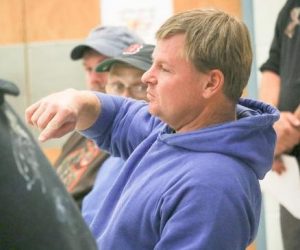
Trawl limit in Blue Hill Bay not an end to cross-zone fishing issue
A possible compromise with Zone B lobstermen over the boundary lines of a new five-trap trawl limit occupied a Zone C lobster council meeting October 1, the day the rule went into effect. The trawl limit covers a Zone B that is also fished by Zone C license holders, about six miles off Frenchboro around Mt. Desert Rock. A Zone B-proposed boundary line change would move the trawl-limit area from the west side to the east side of the rock. Zone B council initiated the trawl limit rule change because they “were getting boxed out by trawls,” Maine Department of Resources Lobster Council Liaison Sarah Cotnoir said,,, >click to read<14:42
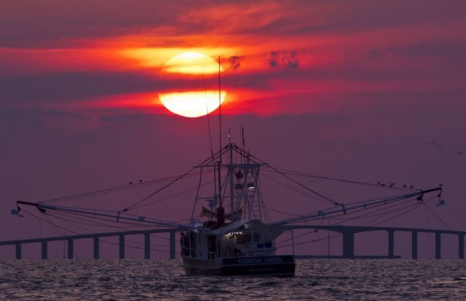
US Shrimp business making slow progress
Despite low dockside prices and other setbacks, local shrimping families say they have hope for this year and those to come, pointing to signs of recovery that are small, but nonetheless seen as positives. The industry got a big shot in the arm earlier this month when President Donald Trump signed into law an appropriations bill that includes money to monitor shrimp coming from other countries into the US, to verify that the companies involved are acting in accordance with US trade laws. >click to read<16:19

































